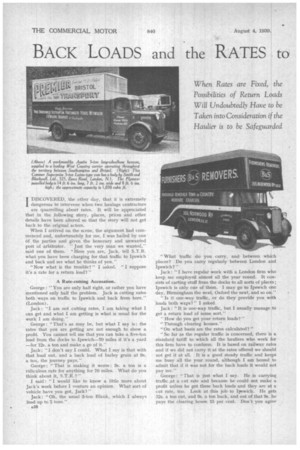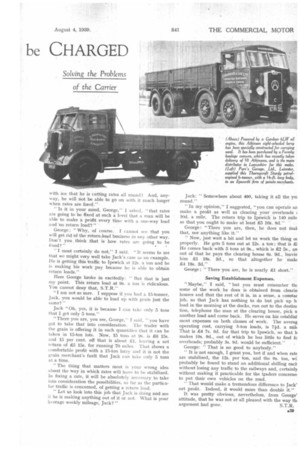BACK LOADS and the RATES to be CHARGED
Page 40

Page 41

If you've noticed an error in this article please click here to report it so we can fix it.
When Rates are Fixed, the Possibilities of Return Loads Will Undoubtedly Have to be Taken into Consideration if the Haulier is to be Safeguarded
T DISCOVERED, the other day, that it is extremely dangerous to intervene when two haulage contractors are quarrelling about rates. It will be appreciated
that in the following story, places, prices and other details have been altered so that the story will not get back to the original actors.
When I arrived on the scene, the argument had com menced and, unfortunately for me, I was hailed by one of the parties and given the honorary and unwanted post of arbitrator. "Just the very man we wanted," said one of them. "Here you are, Jack, tell S.T.R.
what you have been charging for that traffic to Ipswich and back and see what he thinks of you."
"Now what is the trouble'? " I asked. "I suppose it's a rate for a return load?"
A Rate-cutting Accusation.
George : "You are only half right, or rather you have mentioned only half the problem. Jack is cutting rates both ways on traffic to Ipswich and back from here."
(London).
Jack : "I am not cutting rates, I am taking what I can get and what I am getting is what is usual for the work I am doing."
George: "That's as may be, but what I say is: the rates that you are getting are not enough to show a profit. You cannot tell me that you can take a five-ton load from the docks to Ipswich-70 miles if it's a yard —for 12s. a ton and make a go of it."
Jack: "I don't say I could. What I say is that with that load out, and a back load of barley grain at 9s.
a ton, the journey pays."
George "That is making it worse: 9s. a ton is a ridiculous rate for anything for 70 miles. What do you think about it, S.T.R.? "
I said : "I would like to know a little more about Jack's work before I venture an opinion. What sort of vehicle have you got, Jack?"
Jack : "Oh, the usual 8-ton Blank, which I always load up to 5 tons." a3.9 "What traffic do you carry, andbetween which places? Do you carry regularly between London and Ipswicla?"
Jack; "I have regular work with a London firm who keep me employed almost all the year round. It consists of carting stuff from the docks to all sorts of places; Ipswich is only one of them. I may go to Ipswich one day, Birmingham the next, Oxford the next, and so on."
"Is it one-way traffic, or do they provide you with loads both ways?" I asked.
Jack : "It is one-way traffic, but I usually manage to get a return load of some sort."
" How do you get your return loads?"
" Through clearing houses."
"On what basis are the rates calculated?"
" So far as the regular traffic is concerned, there is a standard tariff to which all the hauliers who work for this firm have to conform. It is based on railway rates and if we did not carry it at the rates offered we should not get it at all. It is a good steady traffic and keeps me busy all the year round, although I am bound to admit that if it was not for the back loads it would not pay me."
George: "That is just what I say. He is carrying traffic ,at a cut rate and because he could not make a profit unless he got these back loads and they are at a cut rate, too. Look at this job to Ipswich. He gets 12s. a ton out, and 9s. a ton back, and out of that 9s. he pays the clearing house 15 per cent. Don't you agree with Me that he is cutting rates all round? And, anyway, he will not be able to go on with it much longer when rates are fixed."
"Is it in your mind, George," I asked, 'that rates are going to be fixed at such a level that a man will be able to make a profit every time with a one-way load
and 'no return load?"
George: "Why, of course. I cannot see that you will get rid of the retum,kvad business in any other way. Don't you _think that is how rates are going to be fixed?"
"I most certainly do not," I said. "It seems to me that we might very well take Jack's case as an example. He is getting this traffic to Ipswich at 12s. a ton and he is making his work pay because he is able to obtain return loads."
Here George broke in excitedly: " But that is just my point. This return load at 9s, a ton is ridiculous. You cannot deny that, S.T.R."
"I am not so sure. I suppose if you had a 15-tonner, Jack, you would be able to load up with grain just the same?"
Jack "Oh, yes, it is because I can take only 5 tons that I get only 5 tons."
"There you are, you see, George," I said, "you have got to take that into consideration. The trader with the grain is offering it in such quantities that it can be taken in 15-ton lots. Now, 15 tons at 9s. is £6 15s. and 15 per cent, off that is about £1, leaving a net return of £5 15s. for running 70 miles. That shows a comfortable profit with a 15-ton lorry and it is not the grain merchant's fault that Jack can take only 5 tons at a time.
"The thing that matters most is your wrong idea about the Way in which rates will have to be stabilized. In fixing a rate, it will be absolutely necessary to take into consideration the possibilities, so far as the particular traffic is concerned, of getting a return load.
"Let ns look into this job that Jack is doing and see if he is making anything out of it or not. What is your 'average weekly mileage, Jack?" Jack: "Somewhere about 400, taking it all the ye; round."
"In my opinion," I suggested, "you can operate as make a profit as well as clearing your overheads ; 1.0d. a mile. The return trip to Ipswich is 140 mile so that you ought to make at least £5 16s. 8d."
George: "There you are, then, he does not Mal that, nor anything like it."
"Now, just wait a bit and let us work the thing ot properly. He gets 5 tons out at 12s. a ton ; that is £: He comes back with 5 tons at 9s., which is £2 5s., an out of that he pays the clearing house 6s, 9d., leavic him £1 18s. 3d., so that altogether he mak( £4 18s. 3d."
George : "There you are, he is nearly £1 short."
Saving Establishment Expenses.
"Maybe," I said, "but you must remember tle some of the work. he does is obtained from clearin houses and that the rest of it is, in a sense, a constas job, so that Jack has nothing to do but pick up h load in the morning at the docks, run out to the destim tion, telephone the man at the clearing house, pick u another load and come back. He saves on his establisl ment expenses on both classes of work. The averag operating cost, carrying 5-ton loads, is 74d. a mil( That is £4 7s. 6d. for that trip to Ipswich, so that h snakes 10s. 9d., out of which he has little to find fc
overheads; probably 3s. 9d. would be sufficient." . George: "That is no good to anybody."
"It is not enough, I grant you, but if and when rate are stabilized, the 12s. per ton, and the 9s. too, wi probably be found to stand an additional shilling eact without losing any traffic to the railways and, certainly without making it practicable for the traders concerno to put their own vehicles on the mad.
"That would make a tremendous difference to Jack' net profit. Indeed, it would more than double it."
It was pretty obvious, nevertheless, from George' attitude, that he was not at all pleased with the way th argument had gone. S.T.R.




































































